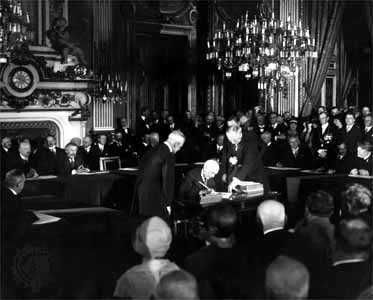Kellogg-Briand Pact
France-United States 【1928】
also called Pact of Paris
 (Aug. 27, 1928), multilateral agreement attempting to eliminate war as an instrument of national policy. It was the most grandiose of a series of peacekeeping efforts after World War I.
(Aug. 27, 1928), multilateral agreement attempting to eliminate war as an instrument of national policy. It was the most grandiose of a series of peacekeeping efforts after World War I.Hoping to tie the United States into a system of protective alliances directed against a possible resurgence of German aggression, the French foreign minister, Aristide Briand (Briand, Aristide), first suggested a bilateral nonaggression pact in the spring of 1927. The U.S. secretary of state, Frank B. Kellogg (Kellogg, Frank B.), prodded by the American “outlawry of war” movement and supported by those who were disappointed at the failure of the United States to join the League of Nations, proposed that the pact be converted into a general multilateral treaty, which the French accepted.
As a result of Kellogg's proposal, nearly all the nations of the world eventually subscribed to the Kellogg-Briand Pact, agreeing to renounce war as an instrument of national policy and to settle all international disputes by peaceful means. The signatories allowed themselves a great variety of qualifications and interpretations, however, so that the pact would not prohibit, for example, wars of self-defense or certain military obligations arising from the League Covenant, the Monroe Doctrine, or postwar treaties of alliance. These conditions, in addition to the treaty's failure to establish a means of enforcement, rendered the agreement completely ineffective.